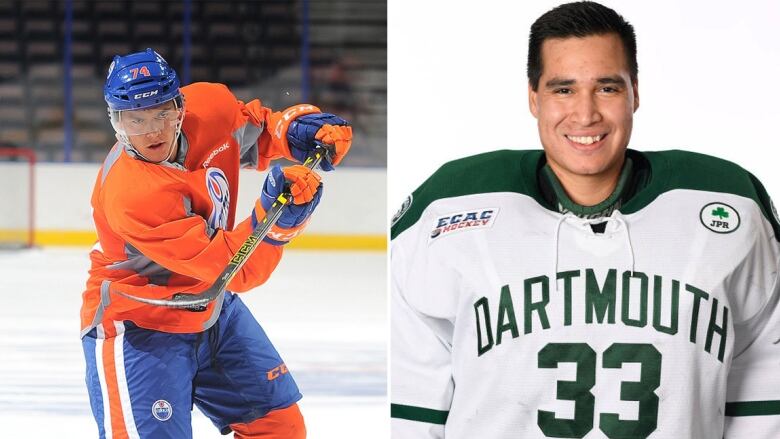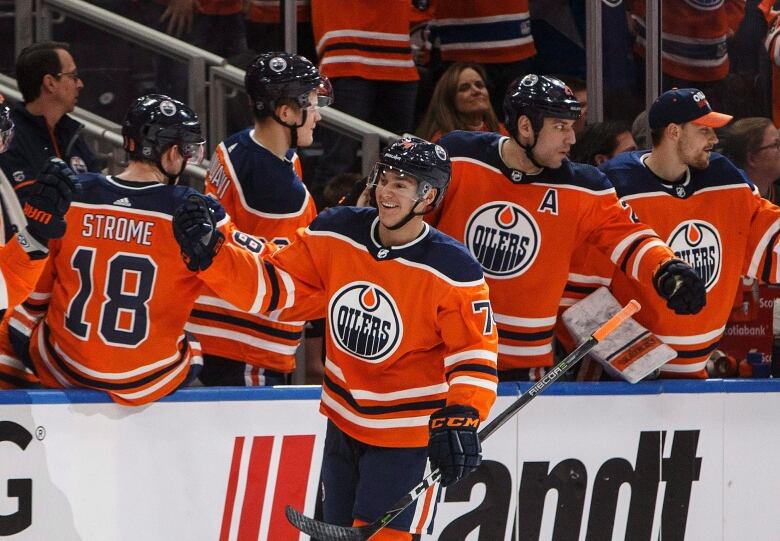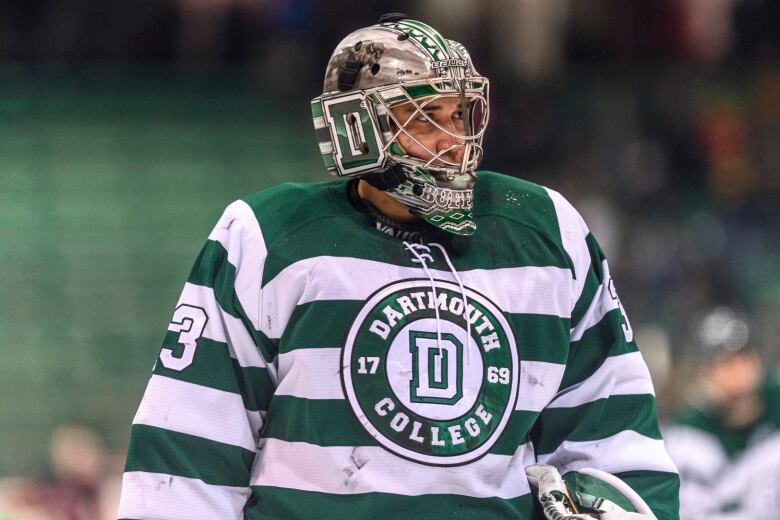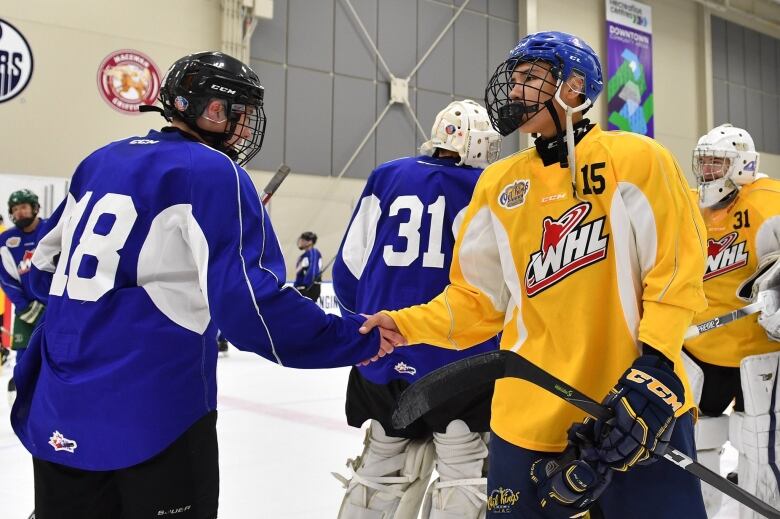The next generation of Indigenous hockey players is aiming to break down stereotypes and inspire others
Ethan Bear and Devin Buffalo took different paths to professional hockey showing youth options

Ethan Bear remembers seeing looks of contempt on some people's faces while he was playing hockey. At the time, Bear, from Ochapowace First Nation in southern Saskatchewan, didn't think much of it.
"I thought it was just people being rude," Bear said.
But as he grew older and started to understand the stereotypes Indigenous people face both on and off the ice, the looks started to make more sense.
"You get those looks for sure," he said.
"The lazy, not hardworking [stereotype], that's definitely one of them. But that's definitely not the case."
Bear, who turned 21 in June, will start the season with the Edmonton Oilers after he was called up to replace an injured Andrej Sekera.
Bear played his early hockey in Ochapowace First Nation in Saskatchewan up until peewee, when he played more competitive hockey in the surrounding communities before heading to Kelowna, B.C., and then Seattle, in the Western Hockey League.

A self-described rink rat, Bear found his passion for hockey early on with the influence of his older brother, Everett. The stereotype of Indigenous hockey players being lazy only pushed Bear to be at the rink even more.
"I think people put a certain stereotype on us because of the things they don't know or haven't learned yet," Bear said.
"You definitely do use it for motivation."
He looks up to players like Carey Price, Jordin Tootoo, Arron Asham, Brandon Montour and Michael Ferland all of Indigenous descent.
"You know what the grind is like and what they've gone through," Bear said.
"They kind of cleared the path for me."
Now Bear is already trying to make a difference at home he runs a hockey camp in Ochapowace during the summer for youth in the surrounding area.
"It's always nice when you're not the only First Nations person out there," Bear said.
'I made it into a positive'
Devin Buffalo, 25, originally from Samson Cree Nation in Maskwacis, Alta., recently signed his first professional contract with the Greenville Swamp Rabbits of the ECHL.
Before signing in South Carolina, Buffalo leveraged his talent as a goaltender into a degree from Dartmouth College, an Ivy League School in New Hampshire. In his final year, he was a finalist for the prestigious Hobey Baker award, given to the NCAA's top player.
Goalie wasn't Buffalo's first choice "I actually hated playing goalie," he said but his dad gave him goalie equipment and he found himself in the net on his novice team in Wetaskiwin, Alta.

Buffalo continued through to bantam but couldn't crack the nearest AAA squad in Leduc. He figures he had a size disadvantage with the other goalies he competed against, but said the stereotype of laziness was always in the back of his mind.
"That kind of blankets all Native players to these coaches when you go into these camps," Buffalo said.
"I think it is a barrier, but I made it into a positive."
Buffalo said Bear's success can be inspiring for many Indigenous youth across the country.
"If you see a Native player in Rogers Place on the blueline, it changes everything," Buffalo said.
"It starts dreams. That was always my dream to show people where a Native hockey player could go and overcome these obstacles and stereotypes."
As Buffalo worked to surpass those barriers he faced growing up, he in turn paved the way for players like Kaedin Larocque-Wolfe.
'It wasn't as bad for me'
Larocque-Wolfe, a 15-year-old also from Maskwacis, just cracked the Leduc AAA team, the same team Buffalo struggled to make a few years before.
Growing up, Larocque-Wolfesaid he didn't face the same types of barriers that other players had.

"For people it's different, but it wasn't as bad for me," he said.
"Playing in Maskwacis, you did experience some racism here and there in those little towns you went to, just playing against other teams. It obviously didn't make me feel good it got me mad during games but I think it just made me play better."
The players he looks up to are many of the same cited by Bear, as well as Buffalo.
"Just to see a fellow First Nations person playing in The Show, in the NHL, is amazing," he said.
And for players like Larocque-Wolfe, who are just starting their adult hockey journeys, looking at the different career paths of players like Bear and Buffalo can provide options some of which may not have been otherwise visible.
Larocque-Wolfe attended the Edmonton Oil Kings WHL rookie camp this year. He also toured some Ivy League schools in Boston, looking at the options in the NCAA.
Bear said encouraging fellowIndigenous hockey players is an important part of thebattle to curb the stereotypes.
"When no one wants you to succeed it's like that movie Indian Horse, I can relate a lot to that there's only so much you can do," Bear said.
"I think the best thing is to just try to pave the way for others, so it shows that we aren't what they think."
MORE FROM CBCINDIGENOUS:












_(720p).jpg)


 OFFICIAL HD MUSIC VIDEO.jpg)
.jpg)



























































































